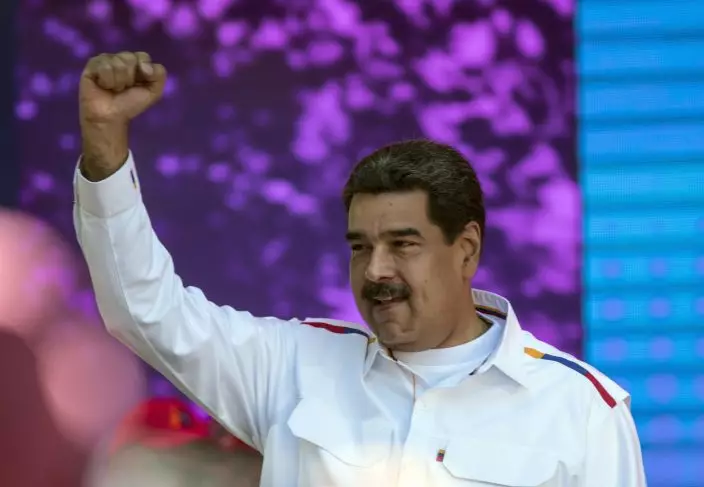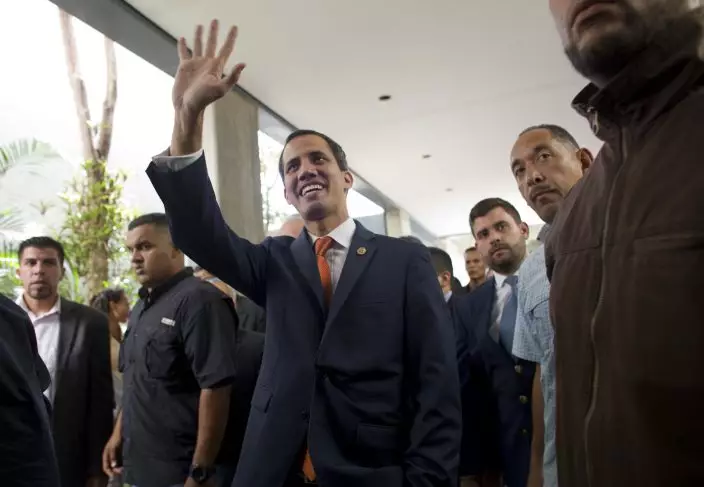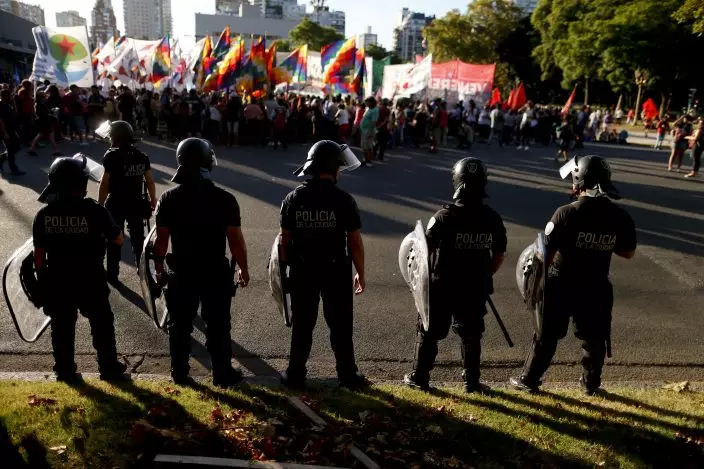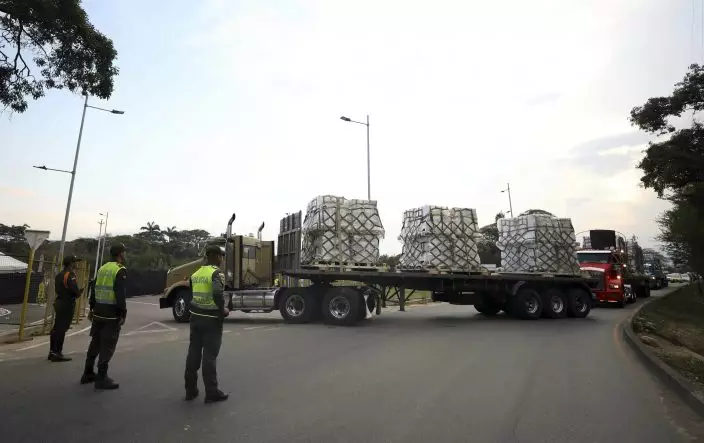U.S. President Donald Trump and Venezuela's opposition are pushing the military to let in humanitarian aid in the belief that it could break a month-long standoff over power in the troubled South American nation. But top commanders are showing no signs of breaking their loyalty to Nicolas Maduro and disgruntled rank-and-file troops have yet to act.
In a speech to Venezuela's exile community in South Florida on Monday, Trump warned Venezuela's military that standing by Maduro could bring disastrous consequences. "You will lose everything," he said.
The threat brought a terse response Tuesday from Defense Minister Vladimir Padrino Lopez, who went on state television to say that Venezuela's military was indeed willing to lose everything — even their lives — to defend Maduro.

Venezuela's President Nicolas Maduro pumps his fist during a pro-government demonstration in Caracas, Venezuela, Tuesday, Feb. 12, 2019. Venezuela's opposition is calling supporters into the streets across the country in a campaign to break the military's support of President Nicolas Maduro. The demonstrations come after more than a month of pressure led by opposition lawmaker Juan Guaido, while Maduro remains firmly in power and at the military's helm. (AP PhotoRodrigo Abd)
"They'll have to go over our dead bodies," he said.
Here's a look at the opposition's struggle to win over Venezuela's all-critical military.
WHY IS VENEZUELA'S MILITARY SO IMPORTANT?
Venezuela's military has served as the traditional arbiter of political disputes in Venezuela and under both the late Hugo Chavez and Maduro has vastly expanded its reach within Venezuela.

Venezuela's self-proclaimed interim president Juan Guaido, center, greets well-wishers upon his arrival to attend an economic forum, in Caracas, Venezuela, Friday, Feb. 15, 2019. The Trump administration is sending another large shipment of humanitarian aid to the Venezuelan border in Colombia, for the first time using U.S. military aircraft as it increases pressure on Nicolas Maduro to give up power, according to a State Department email sent to Congress. (AP PhotoAriana Cubillos)
The military was predominately responsible for overthrowing dictator Marcos Perez Jimenez in 1958 and under the constitution holds no allegiance to any political party or ideology.
The opposition believes that the military's recognition of Juan Guaido as interim president is vital in order to force Maduro out of power and solidify a transitional government.
Venezuela's president by law serves as commander in chief, and so without that recognition, Guaido's self-proclamation as the nation's rightful president is almost wholly symbolic.

Police face demonstrators protesting U.S. intervention in Venezuela, outside the U.S embassy in Buenos Aires, Argentina, Monday, Feb. 18, 2019. The U.S. has used military and civilian aircraft to fly in food and personal care aid to Venezuela's Colombian border, in an effort meant to undermine Venezuelan President Nicolas Maduro and dramatize his government's inability to overcome shortages of food and medicine. (AP PhotoNatacha Pisarenko)
Boasting some 200,000 troops and 1.7 million militiamen, Venezuela's armed forces command not just the nation's firepower but many key sectors of the economy as well, making their backing critical.
Even though Maduro has lost a majority of public support, analysts believe that as long as he maintains the military's support he is unlikely to step down from the presidency.
WHY HASN'T THE MILITARY FLIPPED?

Trucks loaded with USAID humanitarian aid for Venezuela are escorted by police as they arrive at the Tienditas International Bridge in Cucuta, Colombia, on the border with Venezuela, Saturday, Feb. 16, 2019. The U.S. military airlifted tons of humanitarian aid as part of an effort meant to undermine socialist President Nicolas Maduro and back his rival for the leadership of the South American nation. (AP PhotoFernando Vergara)
Venezuela's top military brass has a lot to lose if Maduro leaves power.
Accused of human rights abuses and long suspected of having a role in drug trafficking, many likely fear ending up behind bars and distrust the opposition's offer for amnesty.
"The simply don't believe that amnesty is a viable proposition," said Phil Gunson, a senior analyst with the Crisis Group based in Caracas. "Many of them believe it's a trap."
Lower-ranking troops suffer from the same food shortages and meager earnings as the rest of the nation, but analysts believe they lack the organization to stage a significant rebellion.
About half a dozen mid-ranking officers have pledged their allegiance to Guaido, but they generally don't command large numbers of troops or are already in exile.
While there have been a handful of small-scale rebellions in recent years, none have succeeded, and those who have tried to stage a coup have wound up behind bars or dead.
Case in point: Among those seated at the stage with Trump yesterday was the mother of Oscar Perez, a police officer who was killed after a months-long attempt to fuel a rebellion.
"The big problem they face is if a small group comes out, then they will pay the price that so many others have," Gunson said.
WHY IS BRINGING IN AID CRITICAL TO WINNING THE MILITARY?
With control over the nation's borders, it's the military that will decide whether or not the humanitarian aid Guaido is vowing to bring into the country ultimately enters or not.
The opposition is hedging its bets on a simple premise: That if rank-and-file troops let the aid in, they will essentially have recognized Guaido as Venezuela's commander in chief.
They believe that troops will have difficulty at a fundamental, moral level in using force to stop a mass group of civilians trying to get aid in and are likely to think of their own struggling families.
Eric Farnsworth of the Council of the Americas and Americas Society, a Washington-based think tank, said that to take that step troops will need to be certain that the international community has their back.
He said that while Trump and others have used strong rhetoric, seeking to ensure those who take the risk that they will be rewarded, troops may still be skeptical as to whether it's just talk.
"At the end of the day, this is an individual choice," he said. "It's not just your career; it's your actual life. I think the key is to make sure that those who do take that decision are protected in some way."
WILL THE MILITARY BREAK THE STALEMATE?
Venezuela's crystal ball is still very cloudy.
While the opposition is hoping that if the military does let in aid on Saturday, as Guaido has called for, it will mark a clear turn of events, the reality is the conflict is likely to drag on.
In the short-term, the aid sitting at Colombia's border and in three other collection sites puts Maduro in a tough position. But Farnsworth said it might not have the impact some would hope.
He said that just as critical as getting the aid in is ensuring that it is distributed properly inside Venezuela.
"I think there are some monumental logistical challenges," Farnsworth said. "Unless there's a credible plan for distribution and something that makes sense, then it could potentially backfire."
It's also possible that even if the aid is let in, it isn't seen by the public or even the majority of troops as a clear signal that the military is now backing Guaido as Venezuela's president.
"Both sides will undoubtedly declare victory after the 23rd," Gunson said, referring to the date Guaido set for it to be ferried in by "caravans" of Venezuelans. "And unless there is a clear break between the military and Maduro, I think the show will go on. The struggle for the upper hand will continue."


